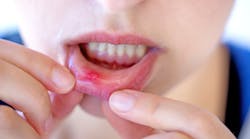Canker sores can happen to anyone, at any age. Although simple canker sores are mostly common in the age group of 10 to 20, complex canker sores can happen at any age. Complex canker sores are rare but people with a history of simple canker sores are prone to them. Scientifically, there is still an open and unsettled debate as to what precisely causes canker sores. Unlike most other dental or oral problems, canker sores do not have a surefire specific cause. There are many arguments and speculations. While there can be some rare factors for an individual, these five reasons are the most common and widespread causes of canker sores.
1. Vitamin deficiency
Most problems of the skin and outermost layers of the human body in areas such as the inside of the mouth are owing to vitamin deficiencies. In case of canker sores, the specific vitamin is B-12. Kids require more vitamins than adults because they are consistently growing and the body keeps demanding more vitamins. Also, kids are the most averse to vitamins. Fruits and vegetables are not typically a dear favorite of the young guns. Thus, vitamin B-12 deficiency is rather common among kids. If this is the cause of canker sores, then taking vitamin capsules or applying the contents of vitamin B-12 capsules directly to areas where sores have developed can offer quick and painless results.
2. Nutritional deficiency
It has been noted in several studies that canker sores are either caused or triggered further when there is a deficiency of folic acid, zinc, or iron in the human body. Deficiencies of calcium can also cause canker sores, but more than causing them, calcium deficiency can worsen the situation. Healthy eating is the best solution to such a nutritional deficiency.
3. Stress/injury
Stress on the tissues or any type of injury in the mouth can cause canker sores. Since the sores are actually tiny ulcers, they can be caused by any kind of hard brushing or eating something that can cause bruises or lead to tissue inflammation in the mouth. Also, many people suffer from injuries from dental equipment such as braces. Using harsh mouthwashes or oral products that can damage the outermost layering of the mouth can also lead to canker sores. Poorly fitted dentures, brushing too roughly, not keeping the mouth clean, or using any harsh product can lead to stress or injury of the tissues and that may cause canker sores!
We also recommend:
But I brush my teeth: 10 causes of periodontitis that go beyond oral hygiene
Cracked tooth: Types, causes, and treatments
4. Fruits and vegetables
Ironically, some fruits that are considered to be very healthy due to their nutrients are actually not desirable when one has canker sores. Many citrus fruits are highly acidic and can cause or worsen canker sores. While it is not entirely accurate to state that fruits such as oranges, lemons, or pineapples can in and of themselves cause canker sores, they can when there is already some stress on the tissues and the surfaces inside the mouth are prone to burn or react to the acidic nature of the fruits. Strawberries, figs, tomatoes, and apples are some of the foods that should be avoided if one has canker sores.
5. Poor immune system
People who have a poor immune system are more prone to canker sores. It is difficult to find a specific correlation of immune system with canker sores and pinpoint what exactly is in one’s immunity that triggers canker sores, but the fact that the immune system cannot prevent or repair it quickly is reason enough to consider it to be a contributing factor. Besides, there is evidence that gastrointestinal problems and other diseases contribute to or cause canker sores.
Originally posted in 2013 and updated regularly







